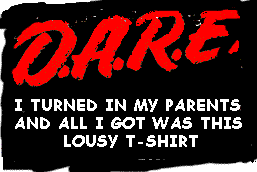General Discussion
Related: Editorials & Other Articles, Issue Forums, Alliance Forums, Region ForumsAnalysis A brief history of D.A.R.E., the anti-drug program Jeff Sessions wants to revive
Analysis | A brief history of D.A.R.E., the anti-drug program Jeff Sessions wants to revive
http://www.msn.com/en-us/news/us/analysis-a-brief-history-of-dare-the-anti-drug-program-jeff-sessions-wants-to-revive/ar-BBEiVkJ
Christopher Ingraham
11 hrs
Speaking at a D.A.R.E. (Drug Abuse Resistance Education) conference this week, Attorney General Jeff Sessions praised the past work of the famous anti-drug program, saying it saved lives:
d.
I believe that D.A.R.E. was instrumental to our success by educating children on the dangers of drug use. I firmly believe that you have saved lives. And I want to say thank you for that. Whenever I ask adults around age 30 about prevention, they always mention the D.A.R.E. program. Your efforts work. Lives and futures are save
Sessions may believe that the program saved lives, but decades of evidence-based research, including some conducted by the Justice Department he now heads, has shown the program to be ineffective — and it might even make the drug problem worse. A little history:
D.A.R.E. was founded in 1983...............................................
........................................
Other research arrived at similar conclusions. In 1994, the Research Triangle Institute, funded in part by the Justice Department, conducted a meta-analysis of all the existing research on D.A.R.E. Its conclusion was withering: D.A.R.E. had little to no impact on rates of teen drug use.
“D.A.R.E.’s limited influence on adolescent drug use behavior contrasts with the program’s popularity and prevalence," the authors wrote. "An important implication is that D.A.R.E. could be taking the place of other, more beneficial drug use curricula that adolescents could be receiving."
The Justice Department was so incensed by this unexpected finding that it refused to publish the study, according to contemporaneous news reports. “I don’t get it," D.A.R.E.’s executive director at the time said of the RTI study’s findings. "It’s like kicking Santa Claus to me. We’re as pure as the driven snow."
But the kicking had only just begun. More studies showing similar findings trickled out in the 1990s. One study even suggested that D.A.R.E. students were more likely than their peers to experiment with drugs and alcohol. The authors of that study chalked that up to a possible boomerang effect: “an attempt to persuade resulting in the adoption of an opposing position instead.” Telling a certain type of kid that he shouldn’t do drugs may simply result in him trying drugs out of spite.
By 2003, the former General Accounting Office launched its own D.A.R.E. study to see if the Justice Department was getting a decent return on its D.A.R.E investment. The conclusion? "No significant differences in illicit drug use between students who received D.A.R.E." and those who didn’t.
The GAO report was the beginning of the end of D.A.R.E. as most of us knew it. Funding started to dry up: In 2002, before the GAO report, D.A.R.E. had an annual budget of over $10 million. By 2012, that figure had shrunk to $3.5 million.
............................
..............Decades of research are unequivocal: The D.A.R.E. of yesteryear didn’t work, and it may have actually made the drug problem worse. Instead of embracing D.A.R.E.’s new evidence-based practices, Sessions offered up a return to the bad old days of drug policy, when decisions were driven by gut feeling and political expediency.
We already know how that story ended: billions of dollars spent, millions of people imprisoned and stronger, cheaper drugs. D.A.R.E. is already trying to turn the page on the harsh and ineffective drug policies of the past. At the moment, it appears the Justice Department is trying to revive them.
http://img-s-msn-com.akamaized.net/tenant/amp/entityid/BBEiXMJ.img?h=557&w=874&m=6&q=60&o=f&l=f&x=394&y=241
SHRED
(28,136 posts)It sent cops into elementary school classrooms creating an aura, a mystique, about illegal substance use.
Kids at that age get drawn in.
They also equated cannabis use with heroin use.
They lied to the kids and created an attraction for usage.
All through elementary school kids are pressured to fit in. To go along with the class. To succumb to peer pressure.
Then they get in middle school and high school they are told by the DARE program and others to "just say no".
We teach insanity.
my kids were subjected to that rat-on-your-parents bullshit propaganda ![]()
Failed program.
EL34x4
(2,003 posts)...should be shot on the spot. He believed that casual drug users whose lives were not a mess of dysfunction and ruin were the most dangerous opponents in the War on Drugs because they undermined the message that ALL drugs destroy lives ALWAYS.
SHRED
(28,136 posts)Just a few months ago.
Dave Starsky
(5,914 posts)for nothin'.
hunter
(38,311 posts)Children can smell bullshit.
Blue_Tires
(55,445 posts)but it was a different time then... And we had a much more positive view of cops in that era
Dave Starsky
(5,914 posts)EVERY kid calls it that.
BTW, the DARE officer in my home town was--you guessed it--busted for drugs.
DefenseLawyer
(11,101 posts)
Dr Hobbitstein
(6,568 posts)